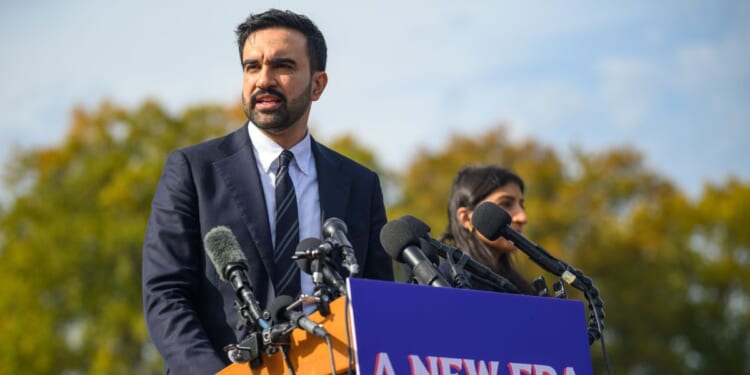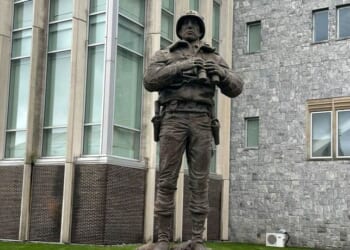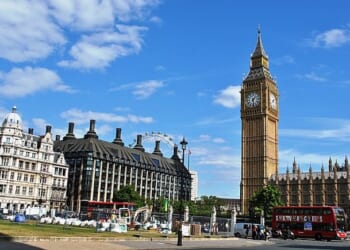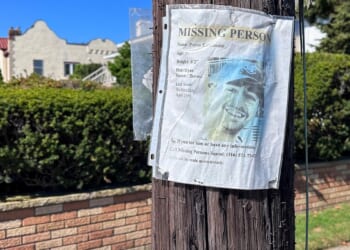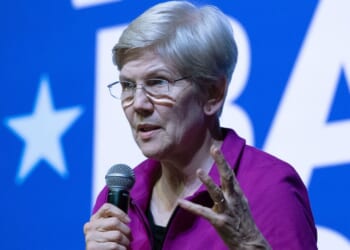Democratic New York City Mayor-elect Zohran Mamdani promised free buses, free childcare, rent freezes, and big-ticket building projects, but the office’s limitations may restrict his sweeping reforms.
Mamdani’s preeminent issue in enacting his policy platform is that New York state controls all taxation in New York City. The mayor proposes all budgets, but ultimate approval is tricky.
Mamdani will need both Democratic Gov. Kathy Hochul and the New York Legislature to approve increases to city-specific taxes to fund his agenda. His stated desire to levy heavier taxes on white people violates federal law. Hochul in 2024 rejected proposals to raise income taxes on the wealthy or otherwise.
The state constitution legally obligates New York City to maintain a balanced budget each year and limits its ability to take on debt to 10 percent of the city’s total real estate value. Hochul proposed a $12 billion increase over two years to New York City’s debt limit, but a final increase is yet to be determined. Mamdani may, with NYC Council approval, reallocate funding given to other projects, but taxation and borrowing remain strictly under the state’s purview. That said, the incoming mayor can still enact critical portions of his policy agenda without recourse to state officials.
BUSES AND TRANSPORTATION
Mamdani’s free bus plan faces significant institutional obstacles. The Metropolitan Transit Authority is a New York state public benefit corporation with an executive board appointed by the governor. Only four of the 23 board members are nominated by the NYC mayor. Current MTA Chair and CEO Janno Lieber signaled opposition to Mamdani’s free rider plan, noting a $1 billion price tag and the need for MTA bondholder approval. Bondholders issue infrastructure development loans and are partially repaid via collected fares.
Lieber previously criticized a Mamdani-sponsored free bus pilot program, saying, “I am concerned that free buses send the wrong message at a moment that we’re trying to push back on fare evasion.” The MTA is the sole authority responsible for setting train, bus, and subway fares in New York City. Bottom line: even if Lieber is replaced by a more Mamdani-friendly chairman and CEO, the MTA’s bondholders retain veto power.
Though Mamdani cannot axe bus fares, he can keep his promise to create new bus lanes. New York City’s mayor unilaterally appoints the Department of Transportation commissioner and may issue executive orders pertaining to certain aspects of transit infrastructure and operations. Democratic Mayor Eric Adams previously issued an executive order restricting migrant buses’ ability to enter New York City after they were sent by Republican Texas Gov. Greg Abbot.
RENT FREEZES
Mamdani’s rent freeze for rent stabilized apartments depends on a regulatory body known as the Rent Guidelines Board. Nine voting members appointed by the mayor constitute the RGB, with two representing tenants, two representing owners, and five representing the general public. Six RGB board members’ terms are expired, and Mamdani may remove them immediately upon taking office. The RGB’s chair serves “at the pleasure of the mayor,” and therefore may also be replaced immediately. Another members’ term expires Dec. 21, 2025.
Unless outgoing Democratic Mayor Eric Adams packs the RGB prior to Mamdani’s inauguration, the newcomer may appoint eight of the nine members, including a new chairman.
Former Democratic Mayor Bill de Blasio successfully convinced the RGB to freeze the rent three times, from 2016-2017, 2017-2018, and 2020-2021. Though de Blasio was sued by landlord groups such as the Rent Stabilization Association, their cases were dismissed by the courts. If Adams decides against packing the RGB, Mamdani is likely to succeed in convincing his appointees to vote for rent freezes four years in a row.
CITY-OWNED GROCERY STORES AND UNION-BUILT AFFORDABLE HOUSING
In an effort to counter rising food prices, Mamdani proposed the construction of five city-owned grocery stores. Mamdani has the authority to build these stores and may tap the New York City Economic Development Corporation to do so. There is ongoing precedent for Mamdani’s produce proposal, as NYCEDC directly operates three of six Public Retail Markets established in 1937. Day-to-day operations in the other three are managed by “housed tenants,” according to the NYCEDC website. Other recent public grocers in Kansas, Florida, and Missouri shut down after costing taxpayers millions of dollars.
Mamdani also promised to build 200,000 affordable housing units, all 100 percent union built. According to Mamdani, the infrastructure initiative will cost $100 billion and be funded via municipal bonds, pooling existing individual rental assistance, and “using the City’s public land as a source of subsidy.”
In order to achieve this level of spending, and the leveraging of municipal bonds, Mamdani requires NYC Comptroller, Council, and NYS Legislature approval. Incoming Comptroller Mark Levine campaigned on solving NYC’s housing crisis and previously called for city-owned property to be converted into affordable housing. Though broadly ideologically aligned with Mamdani, comptrollers historically have a contentious relationship with the mayor in their role as budget watchdogs.
CHILDCARE
The incoming mayor also promised to “implement free childcare for every New Yorker aged six weeks to 5 years” while simultaneously matching childcare worker wages to public school teachers. Mamdani can direct city agencies to expand programming, but, again, it requires state approval to issue the taxes required.
Mamdani may, with NYC Council approval, reallocate funding given to other projects, but taxation and borrowing remain strictly under the state’s purview. De Blasio launched free pre-K for three- and four-year-old children, but the flagship program devolved into a “mess” shortly after its inception.
CRIME AND JUSTICE
Mayor-elect Mamdani has broad executive authority over the New York Police Department (NYPD) and criminal justice system writ large. He is free to restructure the NYPD internally via executive order but requires NYC Council approval should he move to create a separate Department of Community Safety.
Mamdani touted his prospective DCS as a means to remove police from homeless criminal activity responses and other “mental health crises,” CBS reported. Though Mamdani backpedaled his previous anti-police comments, the candidate still urged a departure from traditional policing methods.
De Blasio’s landmark 2020 Bail Reform Act, which ended cash bail and pretrial detention for a slurry of misdemeanors and felonies, contributed to a 36 percent increase in violent crime over the next two years, according to the Manhattan Institute. With a Democrat supermajority, Mamdani will likely be able to implement a soft-on-crime approach with little to no resistance.
TRUMP-PROOFING NYC
Mamdani vowed to make NYC an “LBTQIA+ sanctuary city” as well as a safe haven for immigrants. This will predictably lead to protracted legal battles with the Trump administration, as it has in other blue cities. Mamdani vowed to “Trump-proof NYC,” a goal nigh impossible to achieve given the president’s doggedness in asserting control over other sanctuary cities and Antifa redoubts.
All content created by the Daily Caller News Foundation, an independent and nonpartisan newswire service, is available without charge to any legitimate news publisher that can provide a large audience. All republished articles must include our logo, our reporter’s byline and their DCNF affiliation. For any questions about our guidelines or partnering with us, please contact licensing@dailycallernewsfoundation.org.
Advertise with The Western Journal and reach millions of highly engaged readers, while supporting our work. Advertise Today.

